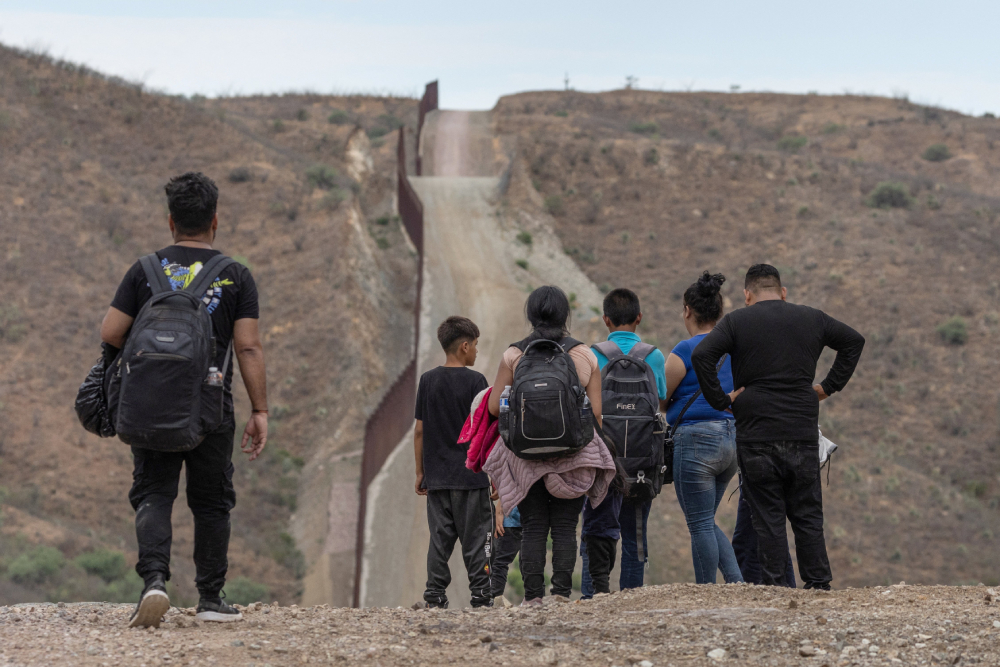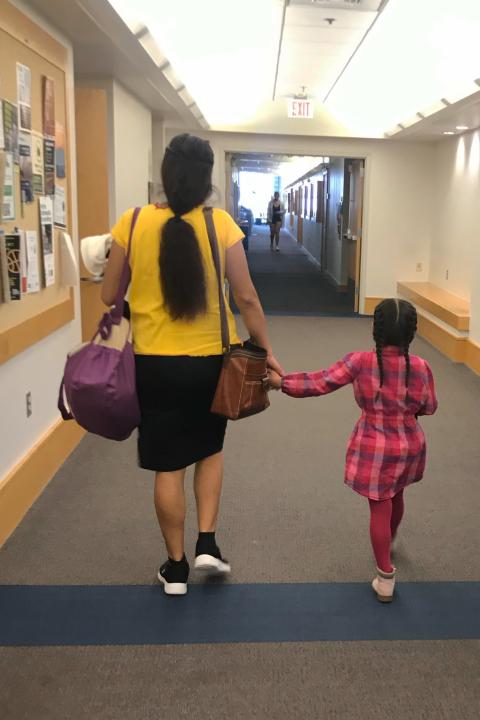
The wall at the U.S.-Mexico border is seen in the background as migrants from South and Central America look to surrender to immigration officials after crossing into the United States from Mexico in Ruby, Ariz., June 24, 2024. (OSV News photo/Adrees Latif, Reuters)
Carlota's hope
"We never lost faith and hope because we always prayed." Carlota’s* words echoed in my ears as I watched the exquisite "Dear America" video the ACLU created to shine a light on her story earlier this month. Carlota fled violence in Guerrero, Mexico with her family and came to the U.S.-Mexico border to seek safety in 2021. We met that summer when Carlota joined a group of migrant leaders who wanted to speak out about being denied access to humanitarian protection during the pandemic. Nearly four years later, she sent me a link to this video when it was published. I was so moved as I watched it. The colors and scenes had me mesmerized, and my eyes filled with tears as I remembered the year she was stuck in Nogales and her determined spirit and focus throughout it all.

Carlota and her daughter speak at Loyola University Maryland. (Courtesy of Tracey Horan)
I was most touched because there was so much hope in the video. Carlota names her hope to live, her hope to be granted asylum. She speaks of her dreams for her children who are already growing and learning in their new home. In the video, this sense of determined hope echoes in the light of the sun, a mother embracing her daughter, a woman writing her dreams down on a piece of paper.
What strikes me about Carlota’s hope, though, is that it isn’t the fruit of things always going the way she planned. Much to the contrary, she never wanted to leave her home. She explains in the video that the transition has not been easy, even though she’s proud of the strides she and her family have made. In the midst of it all, she expresses gratitude that her family is now enjoying a safety that was hard-won and cost them almost everything.
When I consider living into the Jubilee Year of Hope in 2025 alongside people on the move here at the Arizona-Sonora border, this is the only kind of hope that makes sense to me. The hope I can access in this moment is a hope that is profoundly rooted in reality even as it reaches toward what might be possible. This is a hope that knows the pain of loss even as it embraces beauty and possibility.
Learning grounded, tested hope
Last year I had an experience over several months that taught me how to live in this grounded, tested hope. In early summer, I accompanied Marisol,* a woman who wanted to file a complaint against the Border Patrol. The Border Patrol agent who had detained Marisol and her family drove dangerously fast through dark desert roads as her small children bounced around in the back of the vehicle where there were no seatbelts. When the agent struck a cow, the children’s knees hit metal and Marisol’s neck was injured. Everyone in the family was bruised, and the agent, seemingly unconcerned about injuries, pleaded with them to lie and say that he had not been driving fast.
I could feel anger pulsing through my veins as Marisol recounted the story to me and shared that she and her other family members received no medical attention. Instead, when they were escorted to the Border Patrol station, all the agents seemed to be more concerned with comforting the driver and assuring him he would not get in trouble than with the family.
Marisol and her relatives decided they were open to being interviewed about the incident. It was a grueling ordeal that involved small children stuck for hours waiting in an office lobby while the adults in the family offered their testimonies one by one and I attempted to entertain the little ones with invented games and play dough. At the end of the day, when U.S. border officials escorted us back into Mexico, Marisol turned to me and asked, "¿Y ahora qué pasa?" ("And what happens now?") The question still haunts me. I felt pangs of helplessness tighten my chest as I explained to her that U.S. authorities were required to investigate the incident, but there was no guarantee that there would be any consequences for the officer. There was no guarantee that there would be any consequences. I felt our collective heaviness in the face of this reality as we walked slowly back to the migrant center, knowing equally well that truth had been spoken and that it may fall on deaf ears. I found myself questioning the dozens of complaints I had filed over the years that hung in the air without a meaningful response, echoing in the void like Marisol’s question, "¿Y ahora qué pasa?"
Advertisement
In the fall as I was organizing email responses to some of the complaints I had filed, I came across a letter from an accountability office responding to a complaint. I often glaze over these letters because most of them are copy-paste, explaining the rights of the person and then eventually telling me that they have simply filed the information away in a database somewhere. This letter was different, though. It was an update about a complaint I had filed years ago stating that the office was considering this complaint as part of an investigation.
As I kept digging, I found two other similar letters, and then discovered that the investigation had led to recommendations and then to new protocols about how people detained by Border Patrol would be treated in hospitals. I put the pieces together, and realized that complaints I had filed two, three and four years ago actually made a difference. Remembering those atrocious incidents, I imagined that because of the courage of those three individuals who reported their experiences, people detained in Tucson today might not be denied a surgery they needed because a Border Patrol agent is in a hurry to deport them. A woman might actually get copies of her discharge paperwork and x-rays so she can get follow-up care in Mexico. A man may not be deported to Mexico with just a hospital gown and slippers, without shoes.
This realization filled me with what I now know to be a grounded, tested hope. Their voices, my presence and persistence: they mattered. None of us could see where it would go or could even know the full impact of the resulting changes, but we trusted that taking steps in faith would be worth it in the end. And I was looking at written proof that our actions in faith had been worth it.
Pilgrims of hope at the border
In his letter announcing the Jubilee to Monseñor Rino Fisichella, President of the Pontifical Council for the Promotion of the New Evangelization, Pope Francis wrote, "We must fan the flame of hope that has been given us, and help everyone to gain new strength and certainty by looking to the future with an open spirit, a trusting heart and far-sighted vision." As he explains the inspiration for the Jubilee Year motto, "Pilgrims of Hope," he describes the need to recover "a sense of universal fraternity," especially when it comes to people who have been displaced from their native lands.
Every day that I am present at the migrant center where I minister, I see "pilgrims of hope" wherever I turn. They are my colleagues ministering with patience and creativity, pivoting with policy changes and trying new ways to make change when doors close. They are families who take the bus or walk to our migrant center in hopes of finding community, answers to questions and a warm plate of food. They are women artisans who spend hours stitching patterns into fabric in our reception area, with their handiwork manifesting the belief that beauty matters and that they have the power to create it.
This grounded, tested hope can only flow from the belief that, in Carlota’s words, "En manos de mi Dios estamos," ("We are in my God’s hands.") Once in a while the Holy One grants us the grace of written proof. Most of the time, though, our pilgrimage requires that we walk on in faith.
*Name changed to protect identity







